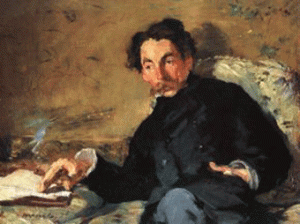“A Subtle Allusion to Stéphane Mallarmé’s ‘Sea Breeze’ Runs through Robert Lowell’s Elegy, ‘Commander Lowell'” by Lynn Levin
 In his elegy to his father, “Commander Lowell” (Life Studies
In his elegy to his father, “Commander Lowell” (Life Studies
, 1959), Robert Lowell includes an allusion to “Brise Marine,” a poem by the nineteenth-century French poet Stéphane Mallarmé. Although the allusion is seldom remarked upon, it is worth exploring as it provides the reader with a passionate and sympathetic perspective on Lowell senior’s nostalgia for the sailor’s life and his probable escapist desires. The allusion to the Mallarmé is somewhat arcane. Although “Brise Marine” is frequently included in anthology selections of Mallarmé’s work, one would practically have to be an expert on Mallarmé see that Lowell was alluding to the poem. But grâce à Google, it emerged easily. I typed the Lowell’s italicized French line into the search box, and voilà up came “Brise Marine” in two translations—one by Richard Wilbur and the other by Peter and Mary Ann Caws. I will, however, refer to a version by a third translator, Kate Flores.
“Brise Marine,” usually translated as “Sea Breeze,” was written in 1865. In it, a world-weary and land-bound sailor dreams of his long-gone days at sea, days which hold a mystic, if morbid fascination. Nothing on land can compare to the thrill of those sailing days. The allusion is an apt one. In “Commander Lowell,” the poet shows his father to be unsuccessful and humiliated in civilian business and social life. As with Mallarmé’s old sailor, his best days are far behind him, and the commander looks back longingly on his days as a young sailor. The final three lines of “Commander Lowell” piteously capture the Lowell senior’s lost glory, “And once / nineteen, the youngest ensign in his class, / he was ‘the old man’ of a gunboat on the Yangtze.”
 The line which Lowell uses from Mallarmé’s original is “Ô nuits! ni la clarté déserte de ma lampe” (Mallarmé line 6). Lowell excerpts the line and tweaks it grammatically to fit the context of his poem so that it reads “Night after night/ à la clarté déserte de sa lampe” (Lowell lines 56-57). Lowell’s French would be translated “in the desolate light of his [father’s] lamp.” Lowell makes two grammatical changes in order to set the scene and shift from the original first-person French to the third person in English. He substitutes the preposition à (in) for Mallarmé’s adverb ni (nor or neither), and the possessive pronoun sa/his for the original ma/my.
The line which Lowell uses from Mallarmé’s original is “Ô nuits! ni la clarté déserte de ma lampe” (Mallarmé line 6). Lowell excerpts the line and tweaks it grammatically to fit the context of his poem so that it reads “Night after night/ à la clarté déserte de sa lampe” (Lowell lines 56-57). Lowell’s French would be translated “in the desolate light of his [father’s] lamp.” Lowell makes two grammatical changes in order to set the scene and shift from the original first-person French to the third person in English. He substitutes the preposition à (in) for Mallarmé’s adverb ni (nor or neither), and the possessive pronoun sa/his for the original ma/my.
Mallarmé’s poem is sixteen lines long. The line Lowell alludes to comes from this section:
Rien, ni les vieux jardins reflétés par les yeux
Ne retiendra ce coeur qui dans la mer se trempe
Ô nuits! ni la clarté déserte de ma lampe
Sur le vide papier que la blancheur défend,
Et ni la jeune femme allaitant son enfant.
(lines 4-8)
Here is a translation of the whole poem by Kate Flores:
The flesh is sad, alas! I have read all the books.
To flee! to flee far away! Where the birds must be drunk
To be amidst the unknown spray and the skies!
Nothing, not old gardens reflected in eyes
Will keep back this heart drenched in the sea,
O nights! nor the desolate light of my lamp
On the empty paper sheathed in its whiteness,
And neither the young wife nursing her child.
I shall leave! Steamer rocking your masts,
Heave anchor for exotic lands!
An ennui, bereft of cruel hopes,
Yet believes in the ultimate farewell of handkerchiefs!
And, perhaps, the masts, inviting storms,
May be those a wind bends over shipwrecks
Lost, without masts, nor masts nor fertile shores…
Still, O my heart, hear the seafarers’ song!
One can imagine Lowell, Sr., feeling insufficient and outcast, sitting at his desk at night in the lonely brilliance of his desk lamp, using his ivory Annapolis slide rule to calculate his hoped-for gain on his losing investments . . . all the while dreaming, like Mallarmé’s sailor, of escape to the sea.
Notes:
1. Foley, Jack. “Richard Wilbur Translates Mallarmé” from The Alsop Review http://www.alsopreview.com/columns/foley/jfwilbur.htm.
2. Mallarmé, Stéphane. “Sea Breeze.” trans. Kate Flores. An Anthology of French Poetry from Nerval to Valéry in English Translation. Ed. Angel Flores. New York: Doubleday, 1962. 147-149.


1 Comment
I found the translation very helpful, but there are a few things I’d change. For the first line, “The flesh is sad, alas, *and* I’ve read all the book.” A small thing, but it gets across better the idea that he’s jaded, both body and mind. I don’t think he’s fleeing to *where* the birds must be drunk; he says “I feel birds must drunk to be…” Meaning, I think, that the birds want to fly just as he does. I’m not sure why she has the steamer “rocking” rather than balancing its masts. “Heave anchor” is a strange expression; “weigh anchor” would be better. And I don’t think the ennui is *bereft of* cruel hopes– I think it’s *heartbroken by* cruel hopes.